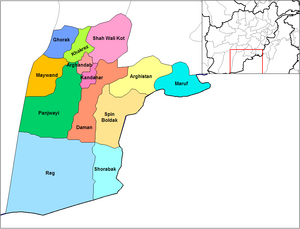Battle of Arghandab (1987)
| Battle of Arghandab | |||||||
|---|---|---|---|---|---|---|---|
| Part of the Soviet-Afghan War | |||||||
 Districts of Kandahar province |
|||||||
|
|||||||
| Belligerents | |||||||
|
|
|||||||
| Commanders and leaders | |||||||
|
|
|
||||||
| Strength | |||||||
| 6,000 | Thousands | ||||||
| Casualties and losses | |||||||
| 500 killed and wounded, 1200 captured or deserted | At least 60 killed | ||||||
The Battle of Arghandab was an offensive launched by Afghan government forces, supported by Soviet troops against Mujahideen strongholds in the Arghandab District of Kandahar Province, Afghanistan. The operation ended in failure, and the government forces withdrew after suffering heavy losses.
During the Soviet war in Afghanistan, the Afghan mujahideen had important forces in the Kandahar area. These were affiliated with different parties, and while they cooperated with each other, they were unable to form a unified command. The principal commanders were Mullah Naqib of Jamiat-e Islami, Lala Malang of Hezb-e Islami Khalis and Abdul Latif of the National Islamic Front of Afghanistan. In early 1987, the mujahideen launched an attack in and around Kandahar. Diversionary raids targeted Soviet and WAD positions, but the main objective were the defensive outposts manned by pro-government militias defending the city. These were the Jowzjani Uzbek militia of Abdul Rashid Dostum, the Achakzai militia of Ismatullah Muslim, and a Baluch force under Meri Baluchis. The militias suffered heavily in the attack, causing the government to plan a retaliatory offensive against resistance strongholds in the Arghandab District.
...
Wikipedia
